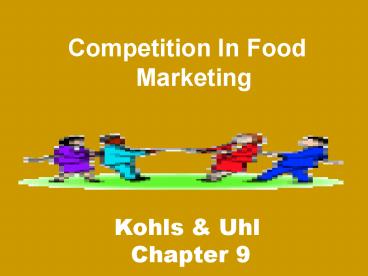Kohls - PowerPoint PPT Presentation
1 / 17
Title:
Kohls
Description:
Wk 2-2: Kohls Ch 3: Ag Prod & Mkting. Wk 3-1: Kohls Ch 4 Food Consumption ... Aldi. Best Meat. On A Bus Line. Best Produce. C. Types Of Prod Differentiation. D. ... – PowerPoint PPT presentation
Number of Views:357
Avg rating:3.0/5.0
Title: Kohls
1
Kohls Uhl Chapter 9
- Competition In Food Marketing
2
Course Concepts
- Wk 1-2 Kohls Ch 1 Intro To Food Mkting
- Wk 2-1 Kohls Ch 2 Analyzing Food Mkt
- Wk 2-2 Kohls Ch 3 Ag Prod Mkting
- Wk 3-1 Kohls Ch 4 Food Consumption
- Wk 3-2 Kohls Ch 5 Food Processing
- Wk 4-1 Kohls Ch 6 Food Marketing
- Wk 4-2 Kohls Ch 7 International Mkting
- Wk 5-1 Kohls Ch 8 Price Analysis
- WK 5-2 KOHLS CH 9 MKT COMPETITION
- Wk 5-3 Friday Midterm
3
Learning Objectives
- 1. Discuss How Competition Influences The Basic
Economic Questions - 2. Differentiate Between Different Levels Of
Competition - 3. Compare Contrast Different Types Of
Competition - 4. Discuss Existing Competition Is The Food
Industry
4
Competition In Food Marketing
Discussion Points
I. Competitions
Role
Ii. Completion Concern
Iii. Completion Concepts
Iv. Competitive Conditions
V. Workable Competition
5
I. Competitions Roles
- A. Answers Basic Economic Questions
1. What To Produce
2. How Much To Produce
3. How To Distribute
B. Produces A Set Of Prices That
1. Influences Buyers Sellers
2. Allocates Resources
C. Important Agent For Change
D. Equates Business Profit With Consumer Needs
Wants
6
II. Competition Concerns
- Freedom For
A. Consumer To Choose
B. Firms To Develop New Products
C. New Firms To Enter Markets
D. Farmers To Grow What They Want
E. Buyers Sellers Arrive At Terms
7
III. Competition Concepts
- A. Levels (In Food Area)
1. Product
Post
2. Firm - Sellers
Kellogg
3. Brands
Coke
4. Regions
Ca
Fla
Stores
Fast Food
5. Institutional
2 Storage Firms
6. Functional
Between Retailers
7. Horizontal
Bargaining Power
8. Vertical
9. Price Vs Non-price
8
B. Types
- 1. Perfect Competition
- A. Very Large No. Of Sellers
- B. Price Takers
- C. Identical Product
- D. No Barriers To Entry
E. Inc Profits By Dec Costs F. Others Not
Rivals G. Adv Not Effective H. Must Adapt To
Market I. Insensitive To Lower Cost K. Ex Farmers
9
2. Monopolistic
- A. Many Sellers
- B. Product Differentiation
- 1. Real
- 2. Imagined
- C. Some Influence On Price
- D. Low Barriers To Entry
- E. Very Elastic Demand
- F. Ex Restaurants
10
3. Oligopoly
- A. Few Large Sellers
- B. Must Consider Rivals
- C. Price Leaders
- D. Some Barriers To Entry
- E. Similar/Diff Products
- F. Us Illegal To Collude
- G. Other Countries Cartels
- H. Ex Cereal Manf
11
4. Monopoly
- A. Only One Seller
- B. Price Setter
- C. Barriers To Entry
1. Patents 2. Control Of Resource 3.
Action Of Governments 4. Economies Of Scale D.
Inelastic Demand E. Ex Public Util, Post Office
12
IV. Competitive Conditions In Food Mkting
- A. Agr Prod Typical Pure Competition
- B. Many Food Firms Operate In Monopolistic
Competition - -- Many Ways To Get Competitive Adv
On A Bus Line
1. Location
Carry Out Personnel
2. Service
Aldi
3. Prices
Best Meat
4. Quality
Best Produce
5. Product Differentiation
13
- C. Types Of Prod Differentiation
1. Branding 2. Packing 3. Promotion 4.
Advertising 5. Product Improvement
D. Consequences Of Differentiation 1.
Increases Consumer Choices 2. Increases Price
Control/Profits 3. Illusion Of New Products
14
V. Workable Competition
- A. Appreciable Number Of Sellers
B. No Powerful Enough To Coerce Rival
C. Sellers Responsive To Profit/Loss
D. No Collusion Among Rivals
E. No Big Barriers To Entry
F. No Preferential Treatment
15
VI. Chapter 9 Summary
- A. Competition Is A Concern
- B. Key Characteristics Of Competition
- 1. No. Of Sellers
- 2. Product Differentiation
- 3. Influence On Price
- C. Food Competition Based Largely On Product
Differentiation - D. Strive For Workable Competition
16
VIII. Self Test Market CompetitionEach Can Be
Used More Than Once
A. Barriers To Entry B. Competition Role C. Brand
Competition D. Competition Concern E.
Monopolistic Comp F. Monopoly G. Oligopoly H.
Pure Competition I. Workable Compet J. None Of
The Above
- __ 1. Competition In Ag
- __ 2. Coke Vs Pepsi
- __ 3. Freedom To Choose
- __ 4. Identical Product
- __ 5. Patents
- __ 6. One Buyer
- __ 7. Fair No Of Sellers
- __ 8. Economic Questions
- __ 9. Prod Differentiation
- __10. Few Large Sellers
H
C
D
H
A
J
E
B
E
G
17
Next Ag Marketing Topic
- Farm Food Prices































